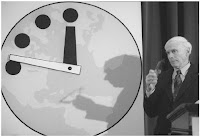Granted, we're in a recession. Granted, times are hard for a lot of people. However, before we undertake sea changes in our economic system, perhaps we should pause long enough to put our current pain into the context of the two centuries of incredible wealth our system has created.
And when I say wealth, I'm not just talking about the wealthy.
Most governments define poverty as the amount of yearly income necessary to pay for a "get-along" basket of goods and services (they call it "standard budget"). The US government's current number is about $10,500 for an individual (for households, the per-person number decreases with the size of the household due to shared expenses).
This buys a person a "basket" of goods and services something like the following (numbers averaged nationally):
- a nutritionally-adequate diet ($300 a month buys you a more-than ample 3,000 calories a day, even without food stamps)
- housing ($400 a month gets you a 20'x20' space even without public housing assistance)
- transportation ($75 covers average monthly bus/subway fares)
- everything else ($110 a month)
It's not a lot, to be sure, but people at this income level do not go to bed hungry or cold. They can count on the safety of an effective police and justice apparatus enforcing the rule of law. They are able to buy food not available locally, or in the current season. They are able to eat meat daily. In fact, poor children today grow up to be, on average, one inch taller and 10 pounds heavier than World War II GIs. If they get sick or injured, they can count on modern healthcare and a social safety net. They can reasonably expect to live past the age of 70.
pounds heavier than World War II GIs. If they get sick or injured, they can count on modern healthcare and a social safety net. They can reasonably expect to live past the age of 70.
On average, they work less than 40 hours a week, and do not need to fear negligent abuse or injury at work. Other activities necessary to support life consume less than 20 hours a week, leaving 52 waking hours for leisure. Per the US Census bureau, the average home owned by persons classified as poor is a three-bedroom house with one-and-a-half baths, a garage, and a porch or patio.
According to several studies (including this leftish one and this rightish one), well over half of people at that income level have air conditioning, at least 2 TVs, a microwave, a cell phone AND a home phone, and a car if they don't live in a major metropolitan area. They take a one-week vacation each year, and buy enough alcohol to get drunk every two weeks.
Moreover, there are a number of assistance avenues which help these individuals increase their standard of living from government direct assistance to religious/charitable programs to (most commonly) family assistance. It is quite common for working-age children, students, and retirees to live with family members or roommates during their (temporary) periods of low income.
 Now visualize the entire history of civilization on the face of a clock, with today as 12:00. Roll that clock back a mere 15 minutes (=250 years in real time) and examine the standard of living, not of the poorest, but of the average citizen. He would, on average live 35 years, all of which within 100 miles of his birthplace. He would have had only vocational education, no voice in regional or national politics. He would have enjoyed no social safety net, instead seeking health care from an alchemist or priest
Now visualize the entire history of civilization on the face of a clock, with today as 12:00. Roll that clock back a mere 15 minutes (=250 years in real time) and examine the standard of living, not of the poorest, but of the average citizen. He would, on average live 35 years, all of which within 100 miles of his birthplace. He would have had only vocational education, no voice in regional or national politics. He would have enjoyed no social safety net, instead seeking health care from an alchemist or priest  who likely would have tried to bleed or exorcise demons out of him. Half of his children would not have seen adulthood, often due to diseases all but erradicated today.
who likely would have tried to bleed or exorcise demons out of him. Half of his children would not have seen adulthood, often due to diseases all but erradicated today.
His occupation would have most likely been manual labor. His home would have been heated by open fire or stove, using wood he chopped. Light would have been provided by candles he made. Food would have been whatever he had recently grown, hunted, preserved, or traded for. Most often it would have given him diarrhea. Electricity, phones, TVs, movies, antibiotics, antibiotics, refrigeration, food preservatives, and cars would have been unimaginable.
 Move the civilization clock to 11:55pm (=1900AD) and over 80% of the world's population (primarily in Africa and Asia) still would have had a not dissimilar standard of living.
Move the civilization clock to 11:55pm (=1900AD) and over 80% of the world's population (primarily in Africa and Asia) still would have had a not dissimilar standard of living.
I could go on, but I'm sure I've already killed the horse. Poverty is a relative concept. Thanks to the amazing wealth creation of our most powerful economies over the last 100 years, the poorest among us is far wealthier and presumably lives a better life than 99% of the humans who have ever walked the face of the earth, as the following excellent chart from The Futurist Blog shows: Additional Reading:
Additional Reading:
http://aspe.hhs.gov/poverty/papers/elassmiv.htm

No comments:
Post a Comment